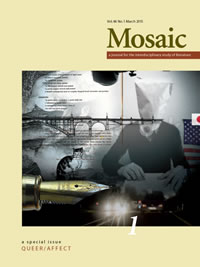Issue 48.1
Overview

Special Issue: Queer/Affect
Published: March 2015
View the issue introduction or see the issue summary and contents below.
12 essays, totalling 224 pages
$24.95 CAD
This issue examines the potential of queer intervention into affect theory, exploring non-normative ways of feeling, existing, and relating. Essay topics include emotion and expression, trauma theory, collectivity, shame, desire, queer subjectivity, and performativity, among others.
Falling in Love with Eve Kosofsky SedgwickJonathan A. Allan What does it mean to love a writer? This essay explores a number of writers and critics who have expressed love for Eve Kosofsky Sedgwick. I argue that love affords another model for thinking through questions of influence, particularly a theory of influence informed by queer theory and affect studies. | |
‘Some Things Are Better Left Unsaid’: The ‘Dignity of Queer Shame’Margaret Morrison Using work of Walt Whitman and David Wojnarowicz, I argue that queer shame, which some LGBTs deny or repress, not only gives meaning to “queerness” but also motivates creative expressiveness in those queer writers/artists who make use of and dignify it. | |
Les enfants queer d’Une saison dans la vie d’Emmanuel de Marie-Claire BlaisCorrie Scott Si l’enfant, dans les livres québécois, fait déjà l’objet de plusieurs analyses, l’avènement de la théorie queer permet de nouvelles interprétations. D’ailleurs, de nombreux théoricien(ne)s queer s’intéressent actuellement au sujet. Cet essai propose, plus précisément, l’analyse des enfants d’Une saison dans la vie d’Emmanuel de Marie-Claire Blais. | |
Queering Breast Cancer’s Affective Narratives: The Summer of Her Baldness and The L WordEmilia Nelsen Affective politics is negotiated throughout breast cancer diagnosis and treatment and has the potential to be performed and narrated queerly. Deploying S. Lochlann Jain’s conception of “elegiac politics,” this essay explores the queer affective terrain of breast cancer via Catherine Lord’s The Summer of Her Baldness and the television drama The L Word. | |
Animal Companions in Sylvia Townsend Warner’s More-than-Marxist WorldMary Sanders Pollock Representations of animal in Warner’s work anticipate twenty-first-century materialist feminism. In addressing animal exploitation and cross-species collaboration, Warner revises Marxist formulations of socioeconomic structures that include both human and more-than-human life. For her, animal agency parallels strategies of colonized peoples, as it must be exerted within alien domains. | |
Hope Against Hope: Queer Negativity, Black Feminist Theorizing, and Reproduction without FuturityJames Bliss The Black subject in Lee Edelman’s queer negativity is explored here as both absent from and productive of its most radical critiques of futurity. The essay attempts to read a different queer negativity within the tradition of Black feminist theorizing. | |
Queering Shame and the Wound of EthnicityDennitza Gabrakova This essay attends to a question raised by a Japanese philosopher about the connection of an American anthropologist’s analysis of Japan as “shame culture” to her queerness. The question opens a poetical and conceptual wound and responding to it takes us to the interstitial areas of postcolonial critique. | |
Feeling So Unusual: Cyndi Lauper and Queer AffectNick Salvato Investigating the work of pop star Cyndi Lauper prompts new reckonings with such concepts as intensity, ecology, and mood, foundational to affect theory. This essay traces the queer force of Lauper’s music—and its relevance to renovating affect theory—through three central movements: feeling intense, feeling inside/out, and feeling brightness, darkly. | |
The Erotics of a Livable Life: Colonial Power and the Affective Work of Queer Desire in Monique Truong’s The Book of SaltMeg Wesling This essay is about the life-making place of desire in queer life. It asks what kinds of lives are made livable through the articulation of desire, and how the structures of feeling that we recognize as queer desire can be written or erased across the historical record. | |
Embarrassment in 1968: Gore Vidal’s Sexuality in the Public SphereGuy Davidson In 1968, William F. Buckley, Jr. called Gore Vidal a “queer” on TV, an event that was widely construed as socially embarrassing. This essay investigates the political implications of embarrassment, both in relation to attitudes toward homosexuality in 1968 and in relation to contemporary queer theory. | |
Woolf’s Einfühlung: An Alternative Theory of Transgender AffectLucas Crawford In popular culture and psychiatry, the question of transgender affect is one still mired in pain: we are commonly thought to experience “dysphoria” and to have been “born in the wrong body.” With Woolf’s Orlando: A Biography as its focus, this essay offers an alternative theory of transgender affect as one of Einfühlung, or aesthetic empathy. | |
Queer Exuberance: The Politics of Affect in Jeanette Winterson’s Visceral FictionTyler Bradway Queer theory approaches positive affects with suspicion while negative affects exemplify “queer critique.” Yet queer fiction represents more nuanced relationships between pleasure and political imagination. For Jeanette Winterson, “queer exuberance” encodes social relations and values that oppose the affective economy of heteronormative biopower. |